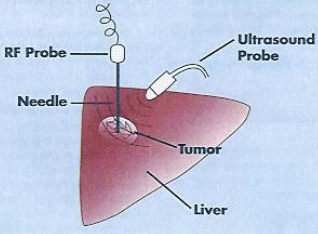Radiofrequency Ablation
What is Radiofrequency Ablation?
Radiofrequency ablation (RFA) is used to treat some types of tumors with a needle and heat.
Tumors that may be treated by RFA are:
- Hepatoma (primary liver cancer).
- Kidney tumors.
- Metastasis (spread) to the liver from solid tumors (such as lung, breast, and colon cancers).
- Lung tumors (primary lung cancer or lung metastasis from cancer in another part of the body).
- Metastasis in the bones from cancer in another part of the body.
- Breast tumors.
- Prostate tumors.
- Pre-cancerous cells associated with Barrett's esophagus.
RFA treats tumors only in the area where the needle is placed. RFA may be used along with or instead of other treatments like chemotherapy, radiation, or surgery. These other treatments are often used if there are cancer cells in other areas of the body.
How is RFA done?
RFA is done in the interventional radiology (IR) department by an interventional radiologist. An interventional radiologist is a doctor who is trained in this type of treatment and uses radiology imaging to guide them. You may also be cared for by nurses, radiology technicians, Nurse Practitioners (NP), and Physician Assistants (PA) in this department.
The procedure is done as an outpatient, meaning you will go home a few hours after the procedure. You will get sedation (to relax you), so you will need someone to drive you home. You should not eat or drink after midnight the night before the procedure.
In the IR department, you will have an IV placed and will be given a sedative medication. Your provider will numb the skin where the needle will be placed in the skin. The IR team will use ultrasound, CT scan, or x-ray to find the tumor and see where the needle should go. Once the needle is placed into the center of the tumor, the tip of the needle is heated. The needle is heated with something called a radiofrequency generator. You may feel the heat and this can be painful, which is why you will get sedation and numbing medications before the procedure.
The heated needle kills the tumor cells. You can have more than one tumor heated during the procedure. It takes about 30 minutes per tumor. This procedure harms the tumor only, so the healthy tissue around it stays healthy.
Once the RFA is done, you will stay in the IR department so your care team can check on you for a few hours. Most patients can go back to their normal activities the next day.
What are the side effects of RFA?
You may feel tired, have pain, or a fever for 1-2 days after the procedure. These can be treated with acetaminophen (Tylenol). More serious side effects are rare but include infection and bleeding. Call your provider if you have a fever that will not go away with acetaminophen, if you have chills, or if you have redness, warmth, or drainage where the needle was inserted.
Is RFA right for me?
You may need to have a CT scan or MRI to see if RFA is the right treatment for your tumor. In some cases, the tumor may be too large or there may be too many tumors, so RFA would not work well. In the case of liver RFA, your liver function must be checked with blood tests before the procedure. Your care team will help you decide if RFA is right for you.
How will RFA help me?
In most cases, RFA is a palliative treatment. Palliative means that it is used to help with pain or to relieve other symptoms to improve your quality of life. Palliative treatment is not meant to cure your cancer. For example, it can be used to shrink a tumor blocking the flow of bile that is causing jaundice (yellowing of the skin and eyes). RFA can be used to lessen pain from bone metastases. For some types of cancer, RFA is a treatment that can improve survival.
This diagram shows a liver tumor being treated with RFA.
Resources and Further Reading
References
The American Cancer Society. (2019). Ablation for Liver Cancer.
The American Cancer Society. (2024). Radiofrequency Ablation (RFA) for Non-Small Cell Lung Cancer.
